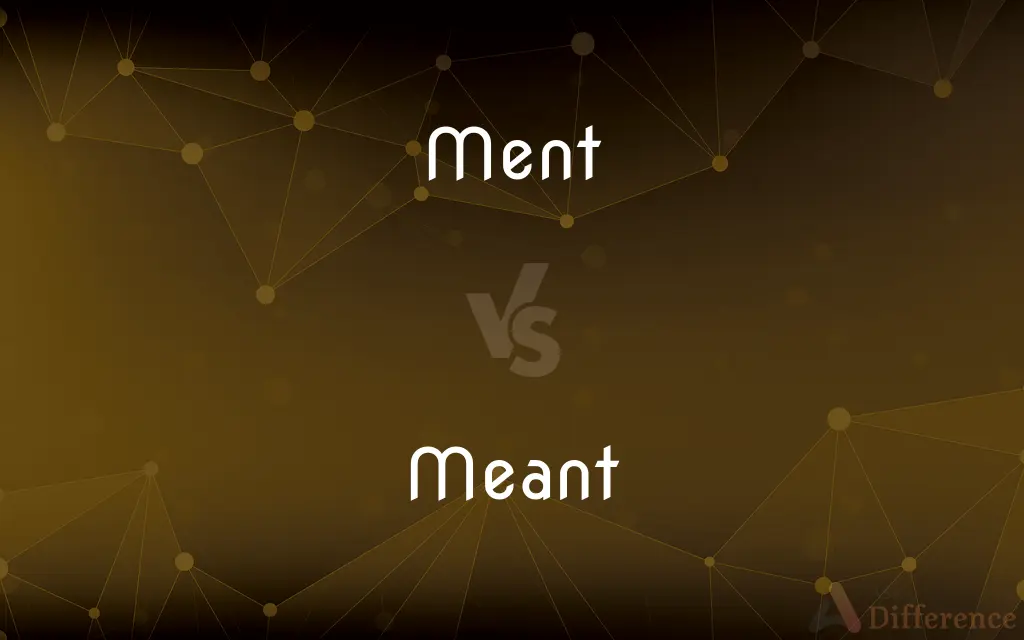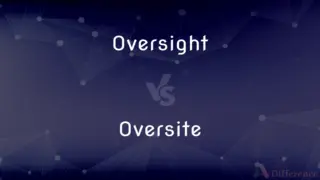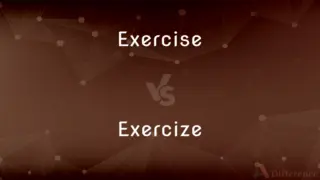Ment vs. Meant — Which is Correct Spelling?
By Tayyaba Rehman — Updated on March 18, 2024
"Ment" is an incorrect spelling of the word "Meant." "Meant" is the past tense and past participle of the verb "mean."

Table of Contents
Which is correct: Ment or Meant
How to spell Meant?

Ment
Incorrect Spelling

Meant
Correct Spelling
ADVERTISEMENT
Key Differences
Remember that "ment" on its own doesn't convey an action, while "meant" does.
Think of "ment" as a typical suffix, but not a standalone word.
"Meant" is related to the idea of "meaning" – both contain an "a."
"Meant" contains an "a," just like its base form, "mean."
If you've "meant" to do something, you've already "mean" to do it in the past.
ADVERTISEMENT
How Do You Spell Meant Correctly?
Incorrect: He really ment well with his suggestion.
Correct: He really meant well with his suggestion.
Incorrect: What exactly ment by that comment?
Correct: What exactly was meant by that comment?
Incorrect: I ment to call you yesterday but forgot.
Correct: I meant to call you yesterday but forgot.
Incorrect: She ment that she would help us next week.
Correct: She meant that she would help us next week.
Incorrect: They haven't ment what they said about the project.
Correct: They haven't meant what they said about the project.
Meant Definitions
Indicated or referred to something.
What he meant was unclear.
Destined or preordained.
They were meant to be together.
Intended for a specific purpose.
This gift is meant for you.
Past tense and past participle of "mean."
I meant to call you yesterday.
Implied but not expressed.
The silence meant agreement.
Past tense and past participle of mean1.
Simple past tense and past participle of mean
Meant Meaning in a Sentence
I'm sorry, I meant no harm.
She meant to bring you the book but left it at home.
This gift meant more to me than you could know.
I meant to save a piece for you.
This victory meant they were heading to the finals.
The promise he made meant he had to go.
What he said meant a lot to me.
He meant to finish the work by today.
That gesture meant the world to her.
The look on her face meant trouble.
The words she chose meant she was serious.
The sign meant we were close to our destination.
What she did meant a great deal to the community.
I meant to ask you about your day.
This law is meant to ensure fairness.
The teacher meant for the lesson to be fun.
The dream meant she had to take a chance.
I think you misunderstood what I meant.
This song has always meant something special to me.
He's always meant to be a leader.
That comment wasn't meant as a criticism.
That symbol meant peace in their culture.
They meant well, even if it didn't seem that way.
His words meant he agreed with the decision.
The rule is meant to protect us.
Meant Idioms & Phrases
Well-meant
Intended to be helpful or kind but not always resulting in positive outcomes.
Her advice was well-meant, but it caused more problems.
Meant in jest
Said or done as a joke, not to be taken seriously.
His comment was meant in jest, though it seemed harsh.
Meant for each other
Perfectly suited for one another in a relationship or partnership.
Everyone could see they were meant for each other.
Meant to be
Destined or fated to happen or be a certain way.
They believe their friendship was meant to be.
Not meant for public ears
Information or statements not intended to be shared widely or with everyone.
That remark was not meant for public ears.
No harm meant
Intended to convey that no offense or damage was intended.
He apologized, saying there was no harm meant by his words.
What's meant to be will always find a way
If something is destined to happen, it will happen regardless of obstacles.
They reunited after years apart, proving what's meant to be will always find a way.
Meant nothing by it
To have no underlying intention or significance behind an action or word.
She assured him she meant nothing by that offhand comment.
Meant to protect
Designed or intended to provide safety or security.
These regulations are meant to protect consumers from fraud.
A match meant in heaven
A perfect and fated romantic union.
Their marriage was a match meant in heaven, filled with love and understanding.
Meant as a compliment
Intended to be taken positively as praise or flattery.
His critique was actually meant as a compliment on your thorough research.
Meant to do well
Having intentions or plans to succeed or be beneficial.
The new policy was meant to do well, though it had unforeseen consequences.
Not meant to be taken lightly
Something that should be considered seriously and with due consideration.
His warning was not meant to be taken lightly.
If it's meant to happen, it will
A belief that outcomes are determined by fate or destiny, not by one's own actions.
He didn't worry about the outcome, believing if it's meant to happen, it will.
Everything happens for a reason, and what's meant to be will not pass by
A saying that suggests every event has a purpose and that destiny will unfold as it should.
Despite the setback, he remained optimistic, believing everything happens for a reason, and what's meant to be will not pass by.
Meant to inspire
Created or done with the intention of inspiring others.
Her story was meant to inspire young athletes everywhere.
Meant to last
Built or designed to be durable or persist over time.
Their friendship was meant to last, enduring all life's challenges.
Meant to enlighten
Intended to provide insight or understanding.
The documentary was meant to enlighten viewers on the issue.
Meant to comfort
Intended to provide solace or consolation.
Her words were meant to comfort him in his time of grief.
Meant to challenge
Designed to test abilities, understanding, or beliefs.
The course was meant to challenge students and push them to their limits.
Common Curiosities
Which vowel is used before Meant?
The vowel "a" is used in "Meant."
What is the root word of Meant?
The root word is "mean."
Which preposition is used with Meant?
Prepositions such as "for," "to," and "by" can be used with "meant," depending on the context.
Is Meant a noun or adjective?
"Meant" is a verb.
Is Meant an abstract noun?
No, "Meant" is not an abstract noun.
What is the pronunciation of Meant?
It's pronounced as /mɛnt/.
Which conjunction is used with Meant?
Any conjunction can be used, depending on the sentence structure.
Why is it called Meant?
It's called "Meant" as it's the past tense and past participle of the verb "mean."
What is the verb form of Meant?
The base verb form is "mean."
Is Meant a collective noun?
No, "Meant" is not a collective noun.
What is the singular form of Meant?
"Meant" does not have a singular form as it's not a noun; it's the past tense of "mean."
What is the plural form of Meant?
"Meant" doesn't have a plural form.
Is Meant a negative or positive word?
"Meant" is neutral; its connotation depends on context.
What is a stressed syllable in Meant?
The entire word "Meant" is stressed as it's one syllable.
What is another term for Meant?
Another term could be "intended."
What is the first form of Meant?
The first form is "mean."
Which article is used with Meant?
Both "a" and "the" can be used, depending on the context.
Is Meant an adverb?
No, "Meant" is not an adverb.
Is Meant a vowel or consonant?
"Meant" is a word, not a single letter.
Is the Meant term a metaphor?
No, "Meant" itself isn't a metaphor, but it can be used in metaphorical expressions.
How many syllables are in Meant?
There is one syllable in "Meant."
What is the opposite of Meant?
Depending on context, "did not mean" or "unintended" could be opposites.
Which determiner is used with Meant?
Determiners like "the," "this," or "that" can be used depending on the context.
Is Meant a countable noun?
"Meant" is not a noun.
What part of speech is Meant?
"Meant" is a verb.
What is the second form of Meant?
The second form is "meant."
How is Meant used in a sentence?
"Meant" can be used like this: "She meant to finish the project by Friday."
Is the word Meant a gerund?
No, "Meant" is not a gerund.
Is the word “Meant” a Direct object or an Indirect object?
"Meant" can be related to either depending on its use in a sentence.
Is the word Meant imperative?
No, "Meant" is in the indicative mood.
How do we divide Meant into syllables?
"Meant" is a single syllable and cannot be divided.
What is the third form of Meant?
The third form is "meant."
Share Your Discovery

Previous Comparison
Oversight vs. Oversite
Next Comparison
Exercise vs. ExercizeAuthor Spotlight
Written by
Tayyaba RehmanTayyaba Rehman is a distinguished writer, currently serving as a primary contributor to askdifference.com. As a researcher in semantics and etymology, Tayyaba's passion for the complexity of languages and their distinctions has found a perfect home on the platform. Tayyaba delves into the intricacies of language, distinguishing between commonly confused words and phrases, thereby providing clarity for readers worldwide.














































